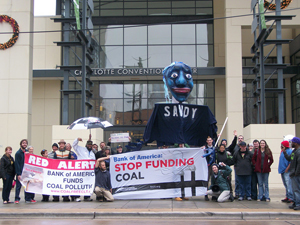
As Bank of America Co-Chief Operating Officer, David Darnell, and outgoing Duke Energy CEO, Jim Rogers, met behind closed doors to forecast 2013’s corporate profits—a storm was brewing in Charlotte.
Immediately before the heavily guarded economic summit was set to begin, an inconvenient visitor arrived and demanded to be let into the meeting: Hurricane Sandy.
Buoyed on a flood of climate protestors from around North Carolina, the 12-foot Hurricane Sandy puppet ensured that responsibility for the ongoing global climate catastrophe wasn’t ignored, but was placed squarely where it belongs: on the shoulders of coal pushing corporations like Bank of America and Duke Energy.
While Bank of America’s executives focus on the bank’s profits, the outlook for our communities is bleak. Thanks to Bank of America’s coal financing, the outlook is rapid climate change, increasing drought, famine, and superstorms like Sandy. The presence of Sandy’s likeness at this economic outlook conference points to the fact that in the months to come, climate will be impossible to ignore—and will majorly disrupt global markets and communities.
Featuring weeping eyes and strands of hair inscribed with the neighborhoods and boroughs devastated by the hurricane, the giant Sandy puppet assailed the meeting’s entryways, and repeatedly faced off with swarms of Charlotte police. While police were able to prevent the Hurricane Sandy puppet from accessing the meeting, these security forces failed to prevent the climate protests from disrupting the meeting.
Only a few minutes into the panel discussion, which focused heavily on Bank of America executive, David Darnell and Duke Energy CEO, Jim Rogers, a RAN activist jumped onstage and unfurled a banner reading “Bank of America: Stop Funding Coal.” The message was successfully delivered, and the activist was ushered out of the building—but not before media took notice and documented the intervention.
As urgency continues to build around the need for strong climate action to end investment and consumption of fossil fuels, bad actors like Bank of America will experience increasing pressure to stop banking on the global catastrophe of climate change—and we won’t stop until they do.